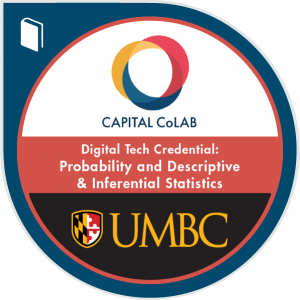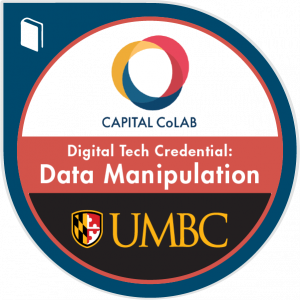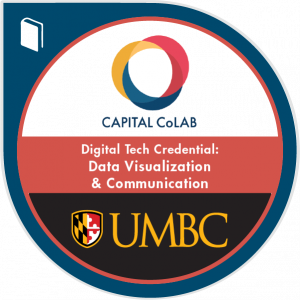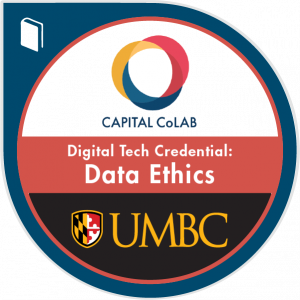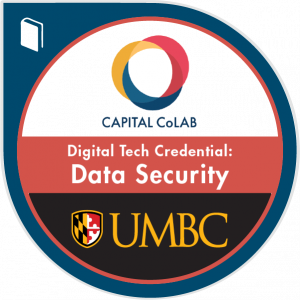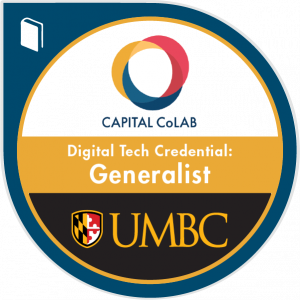 The Digital Tech Credential: Generalist Badge is a free and unique credential that indicates students have in-demand digital literacy skills. The Digital Tech Credential allows the region’s leading businesses and academic leaders to collaborate in scaling a coordinated response to pressing workforce needs. This program is being implemented by universities throughout the Capital Region and is recognized by regional businesses as a differentiator in hiring talent.
The Digital Tech Credential: Generalist Badge is a free and unique credential that indicates students have in-demand digital literacy skills. The Digital Tech Credential allows the region’s leading businesses and academic leaders to collaborate in scaling a coordinated response to pressing workforce needs. This program is being implemented by universities throughout the Capital Region and is recognized by regional businesses as a differentiator in hiring talent.
By completing PRAC112/The Digital Tech Credential as a UMBC student, you will receive a transcript notation as well as a badge that can be displayed on your resume or LinkedIn page.
Below are the 6 modules that are covered in PRAC112/ the Digital Tech Credential.
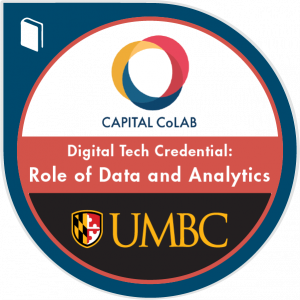 Module 1: The Role of Data and Analytics
Module 1: The Role of Data and Analytics
This competency explores the role that data plays in our everyday lives and why it is important to the world of Data Science. Students will identify what makes data useful and how data are stored; different types of data and differentiate data typologies; and different data applications including transactional data, business intelligence, informational data, social networking, and artificial intelligence. Students will also explore how data are used for risk management and several data analysis techniques.
Module 2: Probability and Descriptive and Inferential Statistics
This competency steps through the process of developing a hypothesis and using data to test the hypothesis. Using COVID-19 data from 2020, students will investigate if the proximity to New York Subway stations had any association with the concentrations of positive COVID-19 cases. Students will also explore regression modeling to test hypotheses.
Module 3: Data Manipulation
This competency examines and applies data manipulation techniques to prepare data for analysis. Students will identify how and why data manipulation is important to the role of data scientists and perform data preparation (removing duplicates, recoding, filtering, and formatting) on a provided dataset. Students will also apply analysis techniques on prepared data sets using Pivot Charts and summarize data with Pivot Tables.
Module 4: Data Visualization and Communication
This competency explores the role of data visualization. Students will identify early players in the data visualization field and advanced data visualizations of today, examine the steps in creating a data brief to inform the story to tell with data and fundamental design components, and create a simple data visualization using open source tools.
Module 5: Data Ethics
This competency examines and investigates data governance issues and why data governance is important to data science and data analytics by the way of current events and articles on data ethics. Students will identify concerns around data collection, personal privacy issues, liability issues, ethical constraints, and bias that impact data analysis. Students will also examine the ethical issues around compliance when it comes to using data for making decisions.
Module 6: Data Security
This competency introduces the role that data security plays in our everyday, the common threats to security, and techniques that help protect and ensure the integrity of data. Students will identify and apply information assurance principles of confidentiality, integrity, availability; identify the concepts risk management and risk management life cycles; describe the spectrum and implications of insider threats; explain various methods to prevent insider threats; explain authorization and access control principles and methods; and explain data classification standards and methodologies based on various risk factors.
Click here to request enrollment or to obtain more information about this zero-credit practicum. Open to all levels and majors. PRAC 112: Digital Tech Credential Information Sheet.
QUESTIONS, please contact Jeremiah Sawyer at the Career Center.
